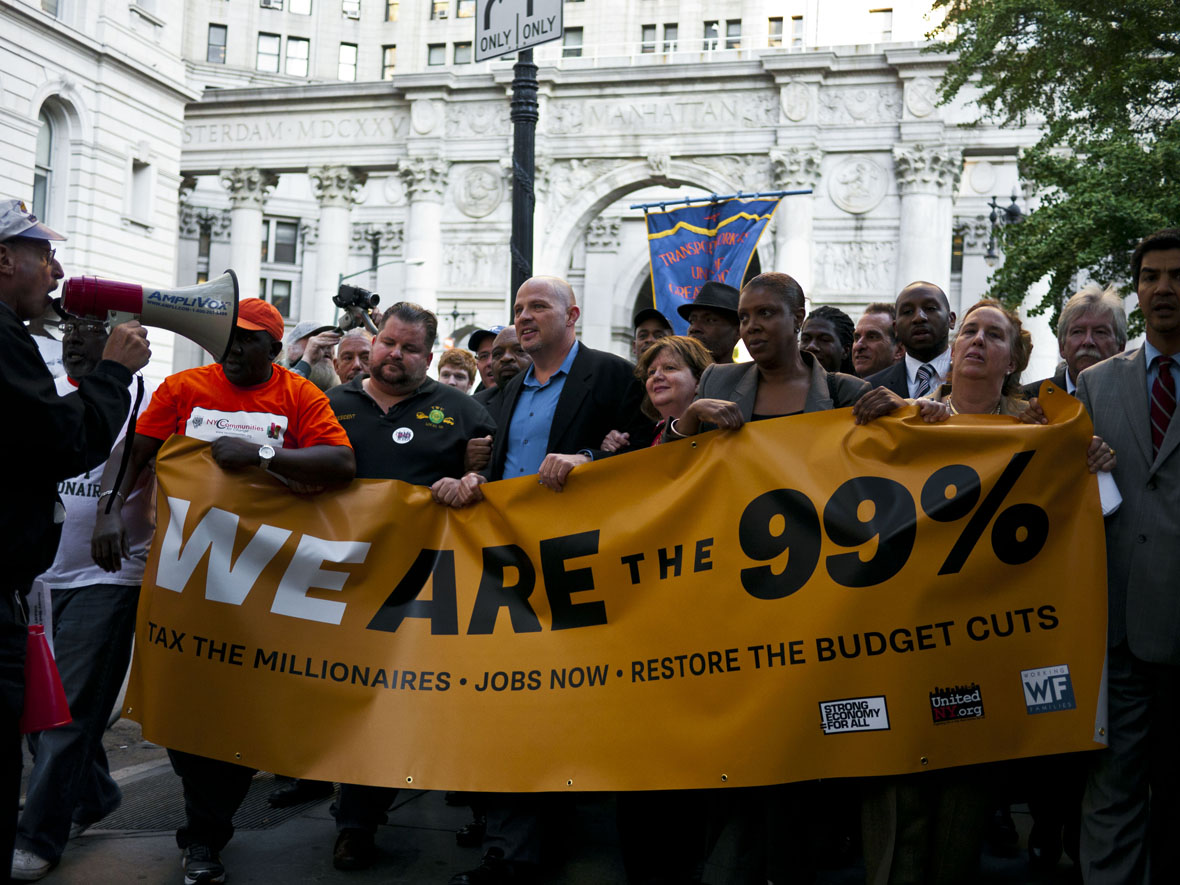The elite the 1% richest? Let's also talk about the 20 percent who live the best.
- Since the outbreak of the great crisis in 2008, and by the way, since the Occupy Wall Street movement rocked the plazas of the wealthiest metropolis, the idea that “we are 99%” is that the richest 1% of the population of the social pyramid crushes us the remaining 99%. The whole truth is a little more complex. In the social pyramid, the richest 20% also have special relevance, which have benefited most from the development of the last decades.

Barack Obama will not easily forget his flight to Saudi Arabia, the same one that was forced by the notable of his party to shame. The events took place in January 2015. Before going up to Riyadh, I had signed the Social Democratic measure promised in the election programme: removing taxes from savings plans for university studies of sons and daughters to the wealthiest in exchange for tax measures that would benefit many more citizens.
It is said that Obama approached Nancy Pelos, the leader of the Democratic majority in Parliament on the plane, to warn that parliamentarians were calling him very nervous, as many of his voters – who earn more than $100,000 a year (EUR 83,000) – were protesting for the new measures. For the plane to take land in Riyadh, Obama had rejected the bill, devoured by his pride as a progressive.
Richard V. The economist Reeves referred to what happened at Le Monde Diplomatique at the end of last October. “The measure Obama wanted to take was good, but underestimated the importance of the upper middle class in American political life.”
Richard V, born English. Reeves, economist and journalist, moved to the United States after being an advisor to the Liberal Democrats, because, he said, he hoped to find on the other side of the water a society with greater openness and mobility than the British. Apparently, there, too, has found a society much more rigid than I thought. That's what a book has written that has already had a lot of resonance: Stacking dreams [Dream Hoarders]. In the subtitle, summarizes the content: “How the upper middle class of the EE.UU. It sinks everyone else, why this is a problem and what to do to fix it.”
Social inequality is a very hot topic, says Reeves, the debate has focused a lot on the richest 1% of Americans, as if the remaining 99% were a homogeneous group. “It often happens that you are talking badly about that chosen club at the top of the pyramid, despite those who are closest to them. Of those who took to the streets on May 1, 2012 called by Occupy Wall Street, one in three had an annual income of over $100,000. (...) The less wealthy elites take advantage of their obsession with the luxuries of the hyper-rich so that their privileges go unnoticed.”
An estimated one-fifth of the United States population, 20 per cent, is over $112,000 per annum -- $93,000 -- in hard-earned families. This upper middle class, in addition to more money than the population average, has a higher level of education, better health, a more balanced family structure, greater life expectancy and the habit of intervening in politics. Many of those who have voted for Trump hate it: journalists, university professors, public officials, technocrats, bureaucrats... “Because they think that, rightly or wrongly, they live deeply under the shelter of others who have authority.”
Class with ‘the power of opinion’
The debate proposed by Reeves is at the beginning: From what number of benefits is a person rich? The issue gets a little more complicated when you start deciding what is called a “profit.” In France, the Inequality Observatory proposes, for example, to count the income of a house by deducting all taxes and to make a family rich when those incomes are two or more times the average of French citizens.
In this way, it would be a rich single parent family that would clearly enter 3,075 euros per month, a couple without children who would enter more than 5,963 euros per month and a family composed of fathers and mothers plus two children from 7,852 euros. In France, according to the Observatoire des Inegalités, the percentage of families entering this category is 9%. Not to be confused, it should be noted that Reeves, with data from the United States, speaks of the richest 20% of the population.
But in addition to the gulf between classes, it's about perpetuating inequality. This is particularly important for Reeves, who is a member of the elite after studying at Oxford elitist. That members of this class share with each other the most interesting jobs, leaving the best positions “at home” and closing the way to those not close, voluntarily or unconsciously.
After all, Reeves says, “We have a huge force as a class. We are powerful because we have in our hands what Bertrand Russell called “the force of opinion.” In all of the spaces that guide public life, in all or almost all of the central positions there are members of the upper middle classes, whether in the media, in the university, in the sciences, in the advertising, in which opinion measurements are made or in the art world. In these strengths, we use to a large extent our strength to strengthen our positions and competences.”
The self-critical economist must take into account his criticism of the discourse “we are 99%”, because it leaves those who are on the ladder of wealth at 98 or 95 quiet, as if they had nothing to do with the consequences of serious social inequalities. “Thus (the members of the richest 20%) will blame the Chit-rich, or the Chit-Chit-rich, because there is always someone richer than us... But as far as the discontinuous class is concerned, not only in terms of economic benefits, but also in terms of the housing market or child education, it is not only 1%”.
Thus, while the members of the upper middle class who are increasingly separated from the lower classes maintain their privileges, the conservatives manage to ensure that the guilty of all evils are the poor people, the minorities and above all the immigrants, and the leftists with a discourse against the 1% elite do not manage to attract the people truly affected by the system.
These accounts are not only produced in the United States. In the dossier Retirement without rest, published on 19 November in the Berria newspaper by Jon Fernández, along with cases that cannot live with the pension, a doctor in law justified the continuation of work until the age of 70: “For those with higher pay, the pension gap is greater than for ordinary workers: If you earn EUR 1,800, you can have a pension of EUR 1,600; but if you have between EUR 4,000 and EUR 5,000 a month, the maximum pension that remains for you will be EUR 2,600. It drops you a lot.” Sic! As if any precarious reader of the Basque press had to sympathize with the professor.
The devastating characteristics of today ' s global world, wars, ecological and social injustices herald an apocalyptic representation of the future anywhere on the planet. Echoes of the nuclear threat further dispel the concern of fear and concern, while politicians... [+]
The effective tax rate that Amazon paid in the last decade was 13 percent. By 2020, the 55 largest companies in the United States did not pay taxes. The effective rate on the profit of companies that in the Spanish state invoiced more than one billion euros was 4.57% in 2019... [+]























